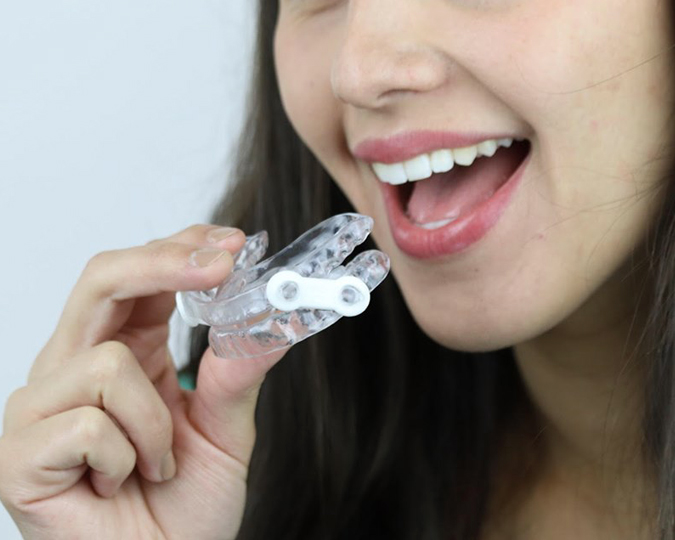How We Treat Sleep Apnea

What is Oral Appliance Therapy?
Is Oral Appliance Therapy Right For Me?
- Have been diagnosed with mild to moderate obstructive sleep apnea, in many cases even severe OSA
- Want to try an alternative treatment option to a CPAP machine
- Are CPAP intolerant
- Have undergone corrective surgery but still have little to no relief from their sleep apnea
- Need a more portable sleep apnea treatment
- Could benefit from combined therapy
How Oral Appliance Therapy Can Help CPAP Patients
Research shows that up to 50% of individuals prescribed to use a CPAP machine do not comply with the treatment. This lack of compliance can be attributed to the machine's loudness, bulkiness, inconvenience, and the feeling of being constricted while wearing the mask.
However, there is an alternative treatment option called oral appliance therapy that addresses all of these issues. These custom-made appliances are silent, easily portable, and provide instant relief from sleep apnea while ensuring increased comfort. They can also be used in conjunction with a CPAP machine for combined therapy. It is important to note that oral appliance therapy may not be suitable for everyone, so it is advisable to consult with your sleep doctor and Dr. Mai before considering this option.
What to Expect After Getting an Oral Appliance
- Jaw tension, clicking, or popping while it adjusts to the new resting position
- Slight soreness in the teeth or gums
- More or less saliva being produced in the mouth
- A change in the feeling of the bite
A Word From the AASM and the AADSM
The American Academy of Sleep Medicine (AASM) and the American Academy of Dental Sleep Medicine (AADSM) are reputable organizations that establish guidelines for preventing, diagnosing, and treating sleep apnea in the United States. These organizations provide doctors like Dr. Mai with the latest research, certifications, and ongoing education.
As experts in the field of sleep apnea, they recommend patients to take into account the following factors when considering oral appliance therapy and overall treatment for sleep apnea.
- Patients who chronically snore should consult with a sleep dentist to make sure it isn’t a symptom of sleep apnea. While not all snorers necessarily have sleep apnea, it could be a sign that a person isn’t getting the most restful sleep that they can. Snoring can be easily addressed using a custom-made oral appliance provided by a licensed practitioner (like Dr. Mai).
- While there are numerous generic oral appliances that can be purchased at the store or online, they should largely be avoided. These are typically made to fit a wide range of people and cannot provide the same results as a custom-made appliance. In many cases, they can cause jaw pain and even make a person’s sleep apnea symptoms worse. It is best to only get an oral appliance through a qualified sleep dentist.
- If a patient is CPAP intolerant, CPAP non-compliant, or otherwise unable/unwilling to consistently use their CPAP, they should consult their sleep doctor to see if oral appliance therapy could provide a viable treatment alternative. They can then partner with Dr. Mai in order for you to receive an appliance (at their recommendation).
- After being fitted for an oral appliance, a patient will need to complete an additional sleep study in order to make sure the device is actually helping to reduce sleep apnea symptoms. They may also need to visit their sleep dentist periodically to make sure their oral appliance is in good working condition.